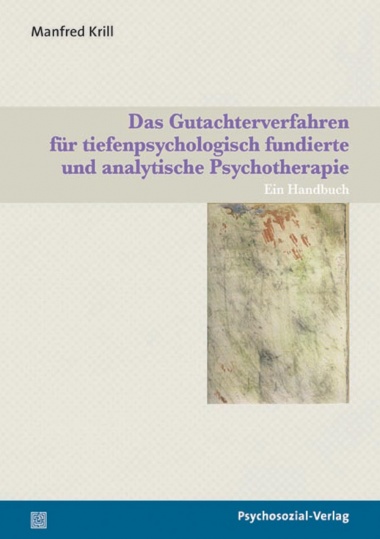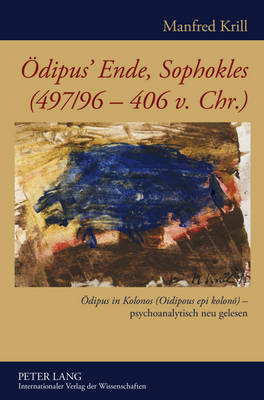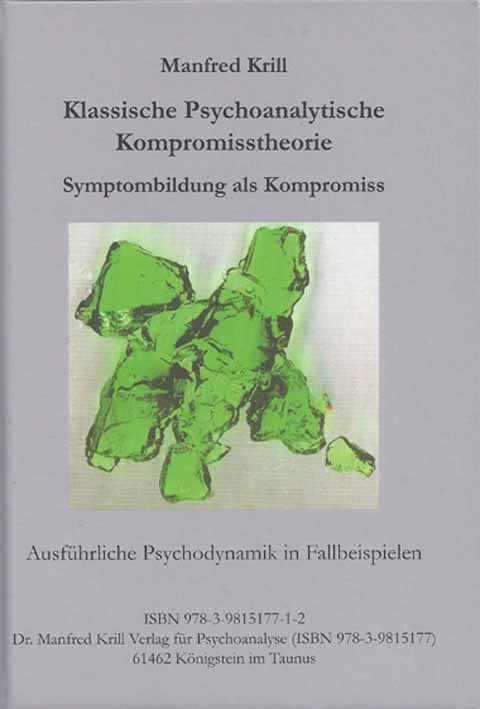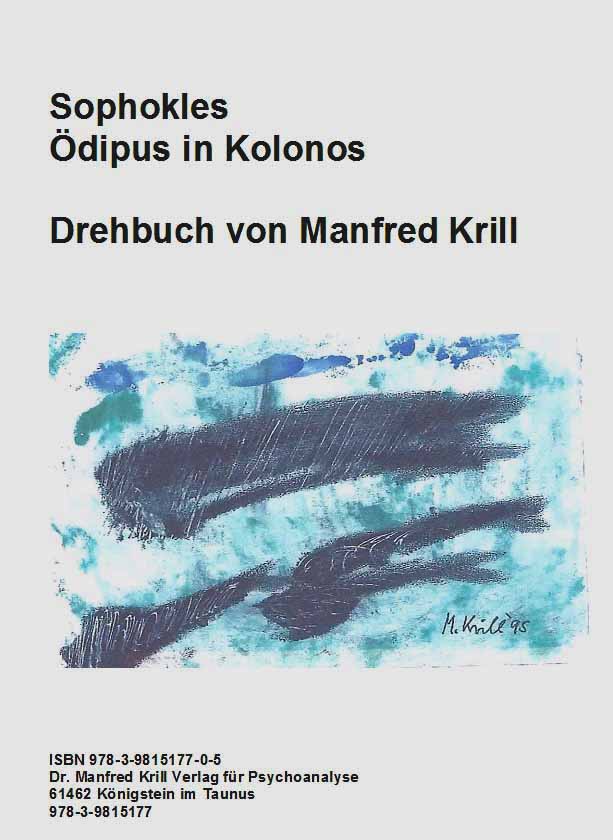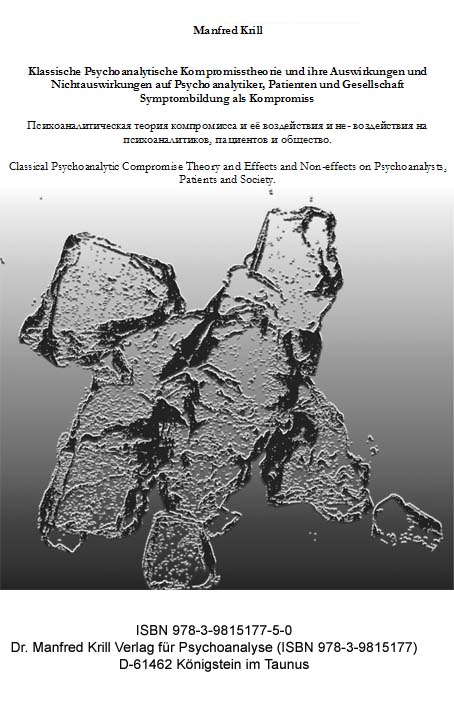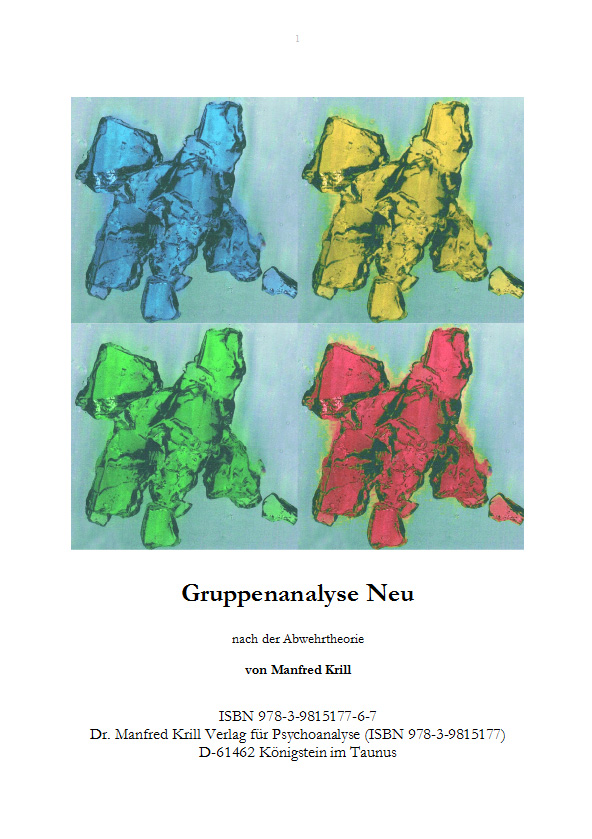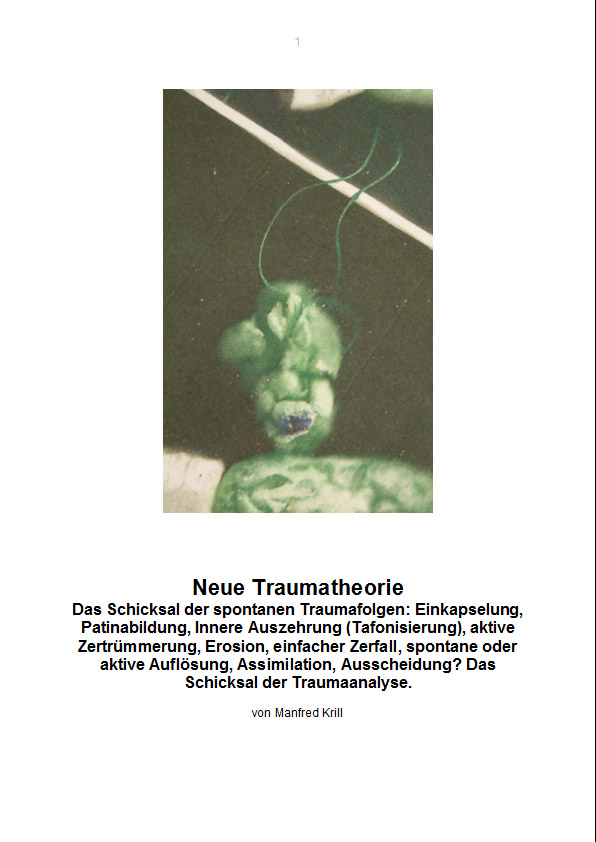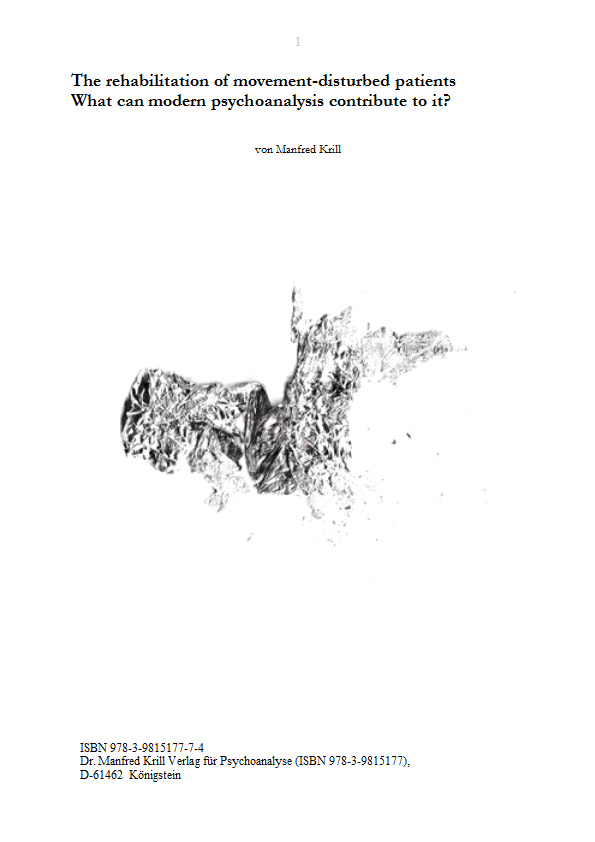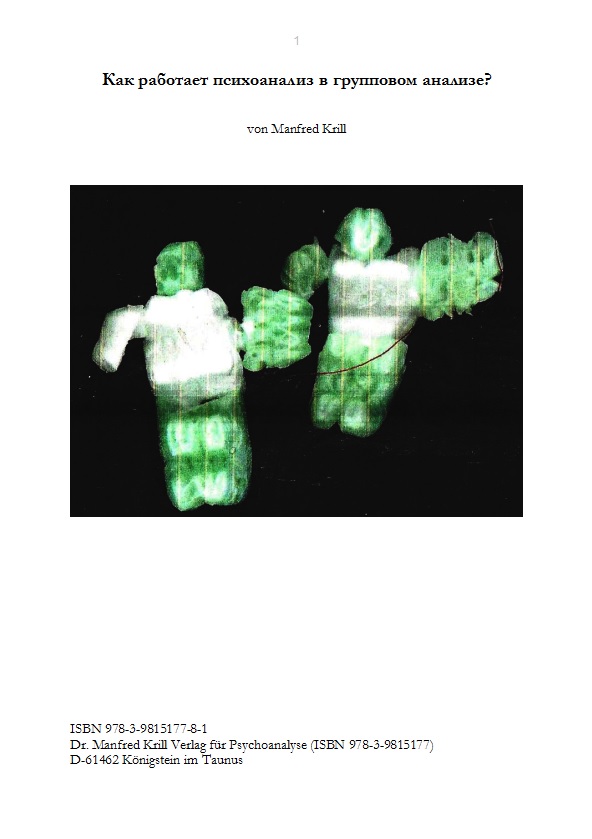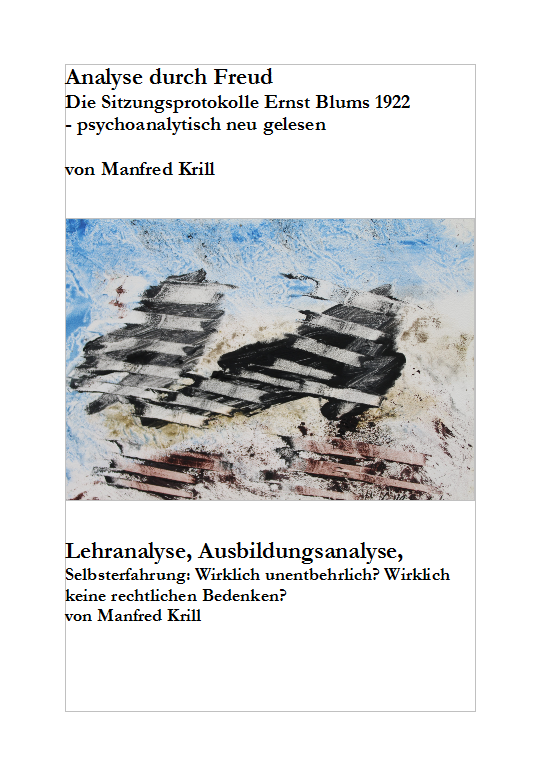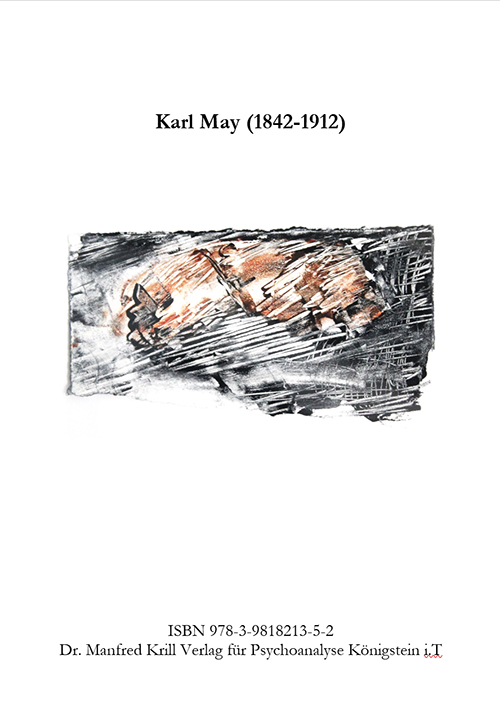Dr.med. Manfred Krill
Psychoanalyst (DPV, FPI, IPV, IPAA), Neurologist, Psychiatrist
Hainerbergweg 53,D-61462 Koenigstein Ruf 06174-23660
manmin@gmx.net
To
JPS (Japan Psychoanalytical Society)
at Kodera Memorial Psycho-Analytical Studies Foundation
3-4, Yotsuya, SC-Building 6th floor, Shinjuku-ku,
Tokyo, 164-0004 Japan
tokyo@jpas.jp
Dear colleagues,
I was enjoyed of reading the last issue of the Psa Inq, Vol 36. Number 2 Febr.-March 2016, titled Psychoanalysis in Japan.
I am psychiatrist, well trained in classic German psychiatry (according to Karl Jaspers, Kurt Schneider, Bleuler, W. Blankenburg and Ruffin). and psychoanalyst, have undergone training analysis, well trained under the direction of Prof. Mitscherlich, Sigmund- Freud- Institut Frankfurt (SFI) and in Group Analysis (Prof. Moeller), examined 1978 , in own practice.
Psychoanalytically I am especially influenced by Prof. Prof. Parin, Prof. Morgenthaler, Dr.Louis Lambelet/ Basel, Prof. Sampson & Weiss, Prof. Arlow, Prof. Brenner, Prof. A. Moser, Prof. W. Schumacher, Prof. Peter Fuerstenau, Prof. Peter Kutter, Prof. O. Renik, Prof. Paul Gray, Prof. T. Shapiro. I hold lessons at the SFI /Frankfurt and at the Russian University of Ischewsk and published psychoanalytical books and articles.
yours sincerely
Manfred Krill
Dr. med. Manfred Krill
Psychoanalyst (DPV, FPI, IPV, IPAA), Neurologist, Psychiatrist
Hainerbergweg 53,D-61462 Koenigstein Ruf 06174-23660
manmin@gmx.net
To
JPS (Japan Psychoanalytical Society)
at Kodera Memorial Psycho-Analytical Studies Foundation
3-4, Yotsuya, SC-Building 6th floor, Shinjuku-ku,
Tokyo, 164-0004 Japan
tokyo@jpas.jp
SOME REMARKS TO PSYCHOANALYSIS IN JAPAN
by Manfred Krill
Working about defense analysis for many years I would like to mention some thoughts to issues in the Psa Inq Nr Vol 36 No 2, Febr- March 2016 ("Psychoanalysis in Japan: Exploring the encounter with otherness" editors Lichtenberg and Bornstein, issue editors Kiyoshi Ogura, MD. and Takshi Okudera, MD).
Beginning with the viewpoint of "guilt culture" vs. "shame culture":
With Paul Gray I hold for the concept of internal conflict ("hidden mental conflict", Doi 2016, 172).
Not the issues of feelings, so of guilt or shame or anxiety, depressive mood, hope, longings for emotional security ("attitudes for dependency", Doi 2016, 173) are in the focus of psychoanalysis. These feelings were well known long time before Freud, so, only to mention, in Greek and Roman literature, including the world of their gods, in the myths of them. Especially in Homers Ilias, so the death of Hector (book 22), feelings of wishes for living further, superiority, proud, anxiety, depression and shame are illustrated , -up to details astonishing us. So are to be mentioned the vivid, later by nobody repeated complaints of Hectors father about his shame (!), the grey hairs of his head and of his genitals and his genitals themselves would be torn and eaten by dogs and birds, if he would visit the killer of his son, Achilleus, at the Greek ships for requesting the body of his dead son. The genitals of his son would not so shame evoking as his own, old ones, the father thought, in opposite to that they would be nice to look at, - unconceivable for us, but in any case very intensively felt and described by Homer!
The great invention of Freud was however his insight in the necessity of a concept of inner unconscious conflicts, to understand the symptomatic as a compromise formation of the components of forbidden wishes, anxiety, guilt- and shame-feelings and the defences against these disagreeable feelings.
"Defence" is an unfelitious word. In German language it means "Verteidigung" and is often falsely translated in this way. The English word defence and the German word "Abwehr" both have their origin in associations of World War I.
The Ego does not defence himself against the drives, but represses them, if necessary, to be not overwhelmed.
The later Freud developed with his daughter (Anna Freud 1936: "Das Ich und die Abwehrmechanismen") the defence (defense) analysis.
Additionally the advantage of this invention is being more independent from cultural viewpoints, so I think. The feelings may differ in whole the world; the unconscious inner conflicts, the defences included, are more similar. So the repression of the different sexual strivings is universal.
Gray (USA, in Germany mostly unknown, in USA of great influence) deplored the "developmental lag" in psychoanalysis, most analytic authors adhering to the early topographic model of psychoanalysis differentiating only between unconscious and conscious feelings or thoughts / fantasies. Who found unconscious material, and that of more and more earlier time, was the big master, without paying attention to the bad outcomes of such treatments ( f. e. "Der Rattenmann"), criticized also by Werner (1940, "constancy fallacy) and Shapiro 1981 ("the endless ambitious race back... without any responsibility").
Many authors do not handle this point, but only choose ("pick out") some feelings they are specialists of or held themselves of, f. e. Wurmser (Switzerland and USA) with his insistence on shame. He derivates all psychic disturbances from that viewpoint, even criminal behaviour.
Most of other authors are fascinated by guilt feelings, other by anxiety feelings.
So stereotyped, preposterous allegations against paedophiles are, they would have only the intention of carving for power. Really many other wishes may be, so longing for youth, beauty, health and other, anxieties, guilt feelings, shame feelings too, defences as avoidance, displacement and other). Nobody seems being interested in these other viewpoints. "Power" is now a buzzword, and onesided unbalanced views are more comfortable than searching for other factors.
I name that "feeling- picking", deducting and abducting to onesided views, neglecting the decisive role of defense.
What do I think about the inner motives to this behaviour of many analysts?
For long time I am impressed by the possibility of conceptualizing the inner conflicts for each individual. Watching the defense punctiliously and obstinately is necessary. Under these conditions and in my experience I estimate defence analysis in transference being very rewarding, but strenuous. Defense analysis takes a lot of full concentration and obstinacy (mentioned by Kinugasa, 132).
I developed the idea therefore defense analysis cannot be popular in the beginning of analysis, neither to analysts, nor to patients.
Therefore analysts choose the easy way of just listening for many, many hours and often years, hoping the transference would all bring into the right (the early Freud: "Im Feuer der Uebertragung soll die Neurose verbrennen", "In the fire of transference all of neurosis will burn out", own translating), - without any working on defense. That however cannot be successful. Nothing will burn out, so my opinion. It`s only an image from the "Holy bible", the "Old testament" ("burning thornbush"), but why should we want to die? Rather we have to work on it (Ogawa, 128: "surgeon"). We will never receive any therapeutic result as a gift, by nobody. Therapeutic effects in this way – waiting, hoping, empathizing, only listening, always having a too ready answer, often justified by "working in Here an Now", working with bees assiduity in "continuous transference interpretations" - are unspecific as many other analytic procedures, consistent of favourable holding functions (as mentioned by Ogawa, 125, 126: .." nothing but only here and now is a world of madness"), not specific for psychoanalysis of inner conflicts. Other persons as friends, mothers, fathers, siblings, businessmen, helpers in medical fields, teachers, pastors, housewives, neighbours can do it even so and do it daily, even so in "Here and Now" and in transference, what else, without having undergone a training analysis or considering themselves as therapists or claiming such. Human beings are endowed with empathy.
For psychoanalyzing inner unconscious we don’t need madness or regressions to earliest states, if these would be at all possible. Gray describes psychoanalysis as craftsmanship, himself as craftsman, in opposite to an artist or an angler, who searches in the depth for unconscious feelings or thoughts for making these conscious. (Ogawa,128: "skillful".. "surgeon"). Gray also resets attention to transference, countertransference and biography, because these distract from work about the defence.
In his- and mine - sense we don’t need understand the whole personality or the whole past or all the relations a patient has developed or possesses in present time, but only the inner unconscious conflict. That’s difficult enough.
Furthermore a widespread error is analysts being estimated excessively suitable for empathy. They did not learn empathy by their training analysis, but, so I hope, were equipped with empathy yet before, perhaps a bit more than other people, and therefore they chose this profession.
You would not believe which extent of empathy in my person my neighbours daily bring out without any effort, without any verbal communication. Sometimes they know more about me than I myself, and I am sure they are right in that. (But probably more important is, what they cannot guess right. About that point – not to be able, to understand another individual – everywhere silence is absolute).
The therapy with defence analysis is more active and more demanding for both participants (full concentrating on defenses overall and in transferences), but in my experience essentially more successful also in short time, with less sessions (under 40 sessions), one- two sessions / week. (Krill 2012, with case reports).
Going back to the two cultures I am emphasizing the role of defenses in these.
I am not sure, if Americans suffer under guilt feelings more than other people. I am not impressed by that guess. I cannot see particular signs of remorse in this country with his – partially - democratic tradition, where developing, having and uttering guilt feelings are not publicly banned as in dictatorships ("....not necessarily have a deep inner sense of guilt, but, instead..". Doi 2016, 172, " a tendency to boast", Doi, 174).
Aggressive feelings (Freud’s aggressive drives), as well, are not less important and effective in Americans than in other people. Why should they do?
But guilt feelings and aggressive feelings are not the essential viewpoints in defence analysis. The decisive point is, how Americans deal in their inner life guilt feelings and aggressive feelings with. I believe them using widely Verdraengung (repression), Vermeidung (avoidance), Agieren (acting out, acting in cockiness, (according to: "..are far more likely to make self-justifying assertions than their Japanese counterparts..", Doi 2016, 173).), Selbst-Idealisierung (self idealizing to behaviour of pomposity), Verleugnung (denial of catastrophes done by themselves without necessity of self defending), Spaltung (splitting of), Isolierung (isolation), Rationalisierung (rationalization, "context of highly rationalized interpersonal relationships, Doi 2016, 174), Intellektualisierung (intellectualization).
The result cannot be a guilt ridden life or an unaggressive life. Especially feelings of aggression of others and of themselves in western world are roughly denied in whole the western world, with the exception of sport and moneymaking. Otherwise aggressive wishes are - in psychoanalysis and in sociology too - unjustly vilified. Everywhere in the Western influenced world you can now hear the devise of "no violence" as motto for life. But the speakers of that don’t know themselves, not the human nature and not the inner life of human beings, rather they deny them. The aggression repressed in this way and to this extent will return even worse. In any case totally repressed feelings will find an outlet against all defenses. The nature of human being don’t allow any total repression, as even dictatorships were forced to experience finally. Total repression fails in whole the world in the long run. Therefore the motto of a life of total abstinence in aggressive feelings, today propagandized also for educating children ("without interdictions", - the neurotic motives of the parents deliberately overlooked and so unrecognized -), will fail as total abstinence in sexual strivings. The very opposite will occur. The ban of war toys is naive ("kitchen psychology", "Kuechenpsychologie"), far from psychoanalytical understanding. The children and teenagers are more aggressive than ever.
A Greek wisdom was: "Ou mē dareis pais // ou paideuetai". In opposite to that there is an ominous tradition in Puritanism, with much hypocrisy.
Shame is doubtless an important feeling. In my childhood (born 1936) shame played a major role than today in my country. The most important viewpoint was the prestige to closed neighbours (behaviour, school, the garden). Eminent clothes were not so important. The curtains were always drawn. My mother was used to stand behind and watch the neighbours (did they watch us to detect any huggermugger?) and the street. My father didn’t mind the neighbours or thinking of other people. Perhaps men are more independent in this point than women, in my country.
Okano (2016, 142) cites himself (in a previous publication) shame being promoted by the Japanese society, but "prohibited" in the US. In my own impression there often shame is merely pretended, feigned, especially in sexual things demonstrative prude, (evoked by historic Puritanism, nonetheless permanently speaking of, with much hypocrisy), really power and capacity or behaviour would be encouraged (Okano 2016, 142).
All feelings, not alone shame, are - intensively - influenced by the society they occur in. So in Germany the Holocaust is not only an object of inner guilt (and shame) feelings in everybody, but also promoted by the society.
But not the feeling of shame (or guilt, or oceanic feeling, longing for cosmic Self (Doi 2016, 176), for safety, dependency, longing for being in good hands of a group or nation, for Balints "Primaere Liebe", amaeru, for seeking a restoration of the once lost quasi-union of mother and infant", Doi 2016, 176) is decisive for the outcome, rather the defences of this feelings. The defences are principally the same as against guilt feelings.
As a side note I would like to mention the danger of onesided preoedipal viewpoints. Emphasizing the wishes and anxieties of early mother-infant-relations is not a new development, not a new discovery, not an exceptional achievement as often falsely suggested, but for long times discussed, beginning with Freud, Anna Freud, M. Klein and many other analysts. What’s about later born conflicts of oedipal, juvenile and adult times? Are all that only mother- infant- conflicts? Are these really in their current accentuation more than a worldwide temporary fashion, as in the past so often in psychoanalysis? I would like of bringing to mind the apparently now forgotten defences of displacement, of negation, idealization of trends, etc. , off the present conflicts to earlier conflicts in analysts and patients too (making evasions, elusions, avoidances, eschewing the disagreeable points of adult life, - "the trend is your friend"). In my experience analysis of present conflicts is painstaking, troublesome, difficult (and very successful), and I am impressed, but not astonished by the many evasive maneuvers to be not confronted with them. Convenience is lurking overall, nobody is free that from.
In this way present aggressive and present violent erotic conflicts are hold out of analytic work in Here and Now, and both, analyst and patient, feel lucky, because the very heavy conflicts are not in the view of transference-countertransference. Both are spared that from.
Namely the reducing (often routinely in such a way minimizing the task) of powerful, vehement erotic feelings of an adult woman as mere love to her mother and so on is seldom appropriate, rather shallow and sometimes offensive ("Should I be only a child? Didn’t you see, that I am a adult woman with all female attributes? Did you anytime look at me?" (Eickhoff 2001, citing Freuds misogynic, scorning, contemptuous, demonstrating revulsion, relegating them into the kitchen, alluding to their breasts, not well known uttering against these females, cit. in Krill 2008: "Suppenlogik mit Knoedelargumenten", Krill 2014: Rezension). Such evasions by analysts are rightly refused by these female patients. There is at all in psychoanalytic tradition a tendency, to pathologisize and infantilisize the adult sexuality and in this way to devalue (Krill, 2008, 196-197). In one case the analyst (cited by Krill 2014: Rezension) asserted to her, her erotic feelings being only urethral-erotic ones, reawoken from childhood. Some female patients obey in this point to their analysts in a false way and agree only out of compliance. The secret motives for denigrating and derision are fears and envy, both unreflected.
Regularly another fallacy is involved here: Confusion between deepness and time table in psychoanalysis. To be early in the time is falsely equated with "deep" and pivotal, later conflict / developments are waved aside and called superficial, not eminent and not essential, mostly these remain even unmentioned. Every inner conflict followed by symptoms merits analytic treatment.
Really there are many common features between transference induced love and normal love.
The defences are in each individual to search for and to treat for detecting the underlying feelings through the patient himself, "irrespectice of cultural differences.."(Doi 2016,175) so amaeru (Doi 2016, 176). The task is only that, - not to get respect the analyst’s imaginations or habits of individual independence and freedom by the patient. We don’t need respect by the patient overall; we cannot have a claim for that. The patient has a claim for healing, and we have to carry out our task. The patient does not come to us, to pay any respect or any admiration to us, his longstanding, hard to solve transferences notwithstanding. He frequents us for getting mitigating and relief, not to other purposes, some analysts may have in mind. Our task is not making the patient "free", but making him free from his inner inhibiting disturbances (Freud).
Anthropophobia (fear against human being), "social Phobia" (ICD-nomenclature), is a neurotic symptom and therefore according to the concept of compromise formation a result, like a pot, many influences in this pot having went in. So wishes for contacts with other persons (not only sexual contacts), fear of not achieving this goal, fear of being rejected or punished for these forbidden wishes, guilt feelings for having too extent wishes for himself, shame feelings for not having reached these aims, to underperform, to underachieve, to lag behind other persons.
But it is not sufficient to think about feelings. We have to add pre-eminently the special kind of defence in case of phobias, that is the defence through avoidance ("Vermeidung") of contacts with other human beings), but further a bit of selfpunishing ("Wendung gegen die eigene Person") through loss of social contacts and therefore emotional and cognitive impoverishment, and often displacement ("Verschiebung") to other activities as with PC, reading much or phoning for hours.
The end of all is the behaviour (compromise formation) of this patient: Only poor contacts, in number and quality, but perhaps a lot of them in his fantasies.
The same procedure is possible with the concept of "narcisstic rage" (Kohut, Okano, 142). According to compromise theory we have to ask for wishes (for brilliant, exceeding success in finding an attractive super partner, in profession, in arts ("to become a performer, to become one with the performer on the stage... competition between performers for popularity by delivering an even better performance, fighting with each other to get into the spotlight... playing the role of star.. making a show of charisma... to make other jealous".. to be the object of people’s envy and jealousy... Kitayama 2016, 168), in moneymaking? in social contacts? in sports? in poetics and literature? in technique? in politics? in knowledge of history? in collecting of academic title, in beautiful appearance? in best fitness? - to mention only some.), anxieties (not to achieve the fulfillment of such wishes? To be rejected? To lag behind? To be ridiculous in the eyes of other people and his own also?), guilt feelings (for having such ambitious wishes, other people pressing aside), shame feelings (of having such ambitious wishes, of not having achieved theses goals and never will have, in comparison with his ancestors, siblings, friends, son, daughter and other people.. to feel sorry for not being able,.., Kitayama 2016, 168) and what kind of defence is used (self punishing? intellectualizations? isolation? self-Idealizations, denial of the achievements of other people? - against aggressive strivings of himself or of other people).
Feelings of inferiority are generally occurring, ubiquitous, in no sense reserved for narcisstic disturbances.
The notion of "narcisstic rage" itself lacks on clinical sharpness. What is the clinical (!) difference between "narcisstic rage" and "rage"? Nobody would respond to this question. Kohut differentiated between "Narcisstic Disorder" (with good prognosis he liked to treat) and "Narcisstic Personality"(he could not treat them successfully, he didn’t like them, he couldn’t cope with them). The clinical differentiating seems arbitrary. The opposite is true: What he couldn’t treat, he called "Narcisstic Personality", - perhaps in itself an act of narcissm?
Trauma (PTSD) and Dissociation disorders are understandable and treatable with compromise theory. The defences here used are isolation (Isolierung), splitting of and displacement ("Verschiebung"), against disagreeable feelings and thoughts. Trauma often is followed by developing a neurotic disturbance, because hampering an previous balance between wishes, anxieties and so on and defence.
Projective Identification (Takahashi T (2016, 192, with an interesting case report) was conceived as a defence mechanism, popular suddenly with Kernberg, but not invented by him. The contradicting words proved ones very attractive, nothing less than fascinating. Meanwhile its use (misuse) is decisively reduced. A supervisor advised not to use this word (Gon 2016, 150). Nobody was able to clarify, what really should happen in this procedure. Should the old Greek people have been afflicted with borderline disease, inasmuch they had brought the horse into the city of Troja? (That was wholeheartedly asserted in argumentation). And the Trojans would have used the defence mechanism of identification? Better sense is given by the assumption, that identification with the projected is meant, - at first projection, then identification with the projected. So it is – in my opinion -a phenomenon of everyday and in this way of course perceived in countertransference too (Takahashi T (2016,192). The question is, if everyday phenomena could be valued as pathological and signs of a disease or only, as here, as valuable signs of countertransference or only as a all day perception as many others, so as a mere function of our neurons ("Spiegelneuronen"). We all are able, because equipped with, to recognize processes in other people, and therefore we don’t need the concept oft identification for that purpose. Once f. e. the "double bind" (1970) was accused for causing schizophrenia, if used by mothers, long ago refuted, recognized as all day phenomenon.
Every case report evokes echoes. The identification itself cannot be projective. Idealization is a permanent danger in our profession.
Prof. Dr. Okada (2016,158) describes in an true to life way – as other psychoanalysts of this volume - , how difficult the ways to be an analyst and the detours were to achieve finally this point ("several transitions", Okada 2016, 158). This phenomenon is well known, among my colleagues too, and I asked repeatedly myself for the causes. I don’t know them exactly. In Germany there were occasions enough for developing directly to an analyst. Not all psychoanalysts are confronted with medical family in origin (Okada 2016, 158). I think Mr Okada is right the contemporary culture (Okada 2016, 158) being the cause. But nobody can exclude additional inner unconscious conflicts involving specific wishes (Wiedergutmachung, reparation?), anxieties, guilt feelings, shame feelings and defences as avoidance, displacement, idealization, intellectualization, negation, denial, identification with the aggressor or reaction formation ("Reaktionsbildung").
"That’s no psychoanalysis, that’s only psychotherapy". This sentence ("one of the greatest difficulties...the distinction between psychoanalysis and psychoanalytic psychotherapy", Okada 2016, 159) was for a long time on everyone’s lips, in Germany too. Meanwhile we all are more cautious. The frequency and the use of the couch are not longer decisive. The concept of regression is very fancied, but controversial, - "regression" is often used, if a defence mechanism is meant, but not recognized (Krill 2008). Transference and countertransference, empathy, biography and many other points are ubiquitous phenomena, not limited to psychoanalysis or psychotherapy, but are only evident part of the life itself. Therefore arouse cynical comments by psychoanalysts themselves: "Psychoanalysis is, what psychoanalysts do" (by hearsay).
To differentiate shame and guilt is not an easy enterprise. Mostly they are intertwined. Nonetheless I feel obliged and useful for myself to differentiate.
For my analytic working I hold – cum grano salis - the idea, guilt feeling is a pain grounded to an inner conflict ego- superego ("internal code of conduct", Doi, 172), shame feeling is a pain relates in first line to other persons, secondarily to the inner authority of self-Ideal ("external code of conduct", Doi 172).
Adding here my metapsychological imaginations is a sign of helplessness and shows, how difficult differentiating really is (".. a person often experiences... simultaneously, because they are closely related, Doi 2016, 173) ".
After reading the cited Psa Inq Vol 36 No.2 some thoughts came to me:
Japanese Psychoanalysis seems closely based on US-American psychoanalysis (but internally, in depth, not so fascinated by as it appears), according to this issue of Psa Inq, in my impression. The phenomenon of such a pilgrimage is supposed by me as "Identification with the aggressor" (Freud, Anna Freud) as the main defence mechanism for repression of aggressive inner impulses of the time before, but also out of the difficulties to get admitted there, to get allowance to live there, to get visa (so to get green card... just sheer luck to get it, Okano 2016, 140-141), not alone as professional necessity following the "Amsterdam shock" (-disaster) and for being joined to the IPV and "being accepted" there (Okano 2016,142), or: "They all told me that if I had been in the United States, I would have been respected" (Gon 2016, 150).
But there are big signs of consideration of thinking what is own about (omote, ura, amae, Doi T. 1986), ajase (Kosawa, cited by Takahashi 2010, cited by Doi 2016, 159) complex and other points (Okada 2016, 159: ..."Japanese therapeutic culture cannot be overlooked when practicing psychoanalysis) in Japan", seishin- bunseki-ka.. .budō ..keidō .. . sadō. ...dō." create an identity of psychoanalysis in Japan and export the new advances in Japan to the West", Okada 2016, 160).
E. Schwaber wrote (published 2016, 186): ".. Japanese cultural traditions..can bring to our understanding of depth- psychological and developmental factors and stresses .. even in our Western cultural milieu. It is surely what I have found in my reach towards the work of Takeo Doi."
Takahashi T (2016, 188) introduced henreki.
The phenomenon of close following – as in Germany also - is understandable by the well known circumstances. In the same way and to the same extent the traditional German, central-european psychiatry (so Kraepelin, Bleuler, Kurt Schneider, Jaspers, studied by many japanese physicians in Germany before the war) later W. Blankenburg, Huber et al. too seems to be disappeared, as in US (and their generously handling of the word "psychosis", neglecting the decisive criterion of "Wahn") and according to the neglect in the US, influenced also by pharma industry and the nomenclatures enforced by them, but now recovering. The old descriptions of schizophrenia are unsurpassed up till today.
Dr. Manfred Krill
References
Arlow J.A & Brenner C 1964: Psychoanalytic concepts and the Structural Theory, NY Int Univ. Press
Blankenburg W 2012: Der Verlust der natürlichen Selbstverständlichkeit , - zur Psychopathologie symptomarmer Schizophrenien, Parodosverlag
Brenner Charles 2003:: Conflict, compromise formation and structural theory Psa Q LXXI,3, 397-418
Doi T (1986): The anatomy of Self- the individual versus society, trans. M. A.. Harbison, Tokyo: Kodansha International
Dorpat Theo L 1979: Is splitting a defense? Int Rev Psa 6, 1, 105-114
Eagle M N 1988: Neuere Entwicklungen in der Psychoanalyse, Verlag Internationale Psychoanalyse (US Orig 1984)
Eickhoff, F.-W. (2001): Sigmund Freuds »Bemerkungen ueber die Uebertragungsliebe«, wiedergelesen im Jahre 1992. In: Freud heute, Wendepunkte in Streitfragen. Bd. 3: Ueber Freuds Bemerkungen über die Uebertragungsliebe. Stuttgart/Bad Cannstatt (frommann-holzboog), S 43–72.
Gill M 1994: Conflict and deficit Psa Q LXIII, 4, 756- 778
Gon S 2016: On becoming and being a psychoanalyst in Japan: What was the Amsterdam shock? Psa Inq Vol 36, No. 2/Febr.-March 2016, 145-154
Gray Paul 1982: Developmental lag in the evolution of technique for psychoanalysis of neurotic conflict J Am Psa Assn 30, 621-655
Hartmann H 1950::Comments on the psychoanalytic theory oft the ego Int Univ Press, 113.141
Holt R R 1976: Drive or wish? NY Int Univ Press
Huber G Gross G Schüttler R 1979: Schizophrenie Berlin Springeverlag
Kano R (2010): The Japan Psychoanalytic Society and the Japan Psychoanalytical Association their history of coexistence and their future. Japanese Contrib. to Psychoanal., 3: 223-242-
Kendell R E 1978: Die Diagnose in der Psychiatrie Verlag Enke Stuttgart
Kitayama O (2016) Becoming a psychoanalyst: To think about the nature of jealousy,
Kinugasa T 2016: Encounter with psychoanalysis: How I became a psychoanalyst, Psa Inq Vol 36, No. 2/Febr.-March 2016, 129-137
Kosawa, Hekasu (1897-1968): 1932 with Freud,
Krill M (2001): Kompromisstheoretische Deutung der Posttraumatischen Belastungsstörung. In: DPV-Informationen, Nr. 31, S. 21–23.
Krill M (2003a): Borderline- Störungen – Sammelbecken für unklare Fälle? In: Neurotransmitter 9, 61–64.
Krill M (2003b): Erfahrungen mit dem Gutachterverfahren. Neurotransmitter 11, 33–37.
Krill M (2005): Erotische Übertragung – Cybersex mit dem Therapeuten. In: Neurotransmitter, 2005, 11, 46–48.
Krill M (2008): Das Gutachterverfahren für tiefenpsychologisch fundierte und analytische Psychotherapie, ein Handbuch, 376 Seiten, Psychosozialverlag Gießen
ISBN 978-3-89806-773-7
Krill M ( 2010):Zur Buchvorstellung „Briefwechsel Sigmund Freund- Nikolai Jewgrafowitsch Ossipow 1921-1929“ im FPI Frankfurt , in DPV- Informationen Nr. 49, S. 96-98
Krill M (2011): Das Ende des Ödipus, Sophokles: Ödipus in Kolonos („Oidipous epi Kolonō“),- psychoanalytisch neu gelesen, Verlag Peter Lang, Internationaler Verlag der Wissenschaften, Bern, Berlin, Frankfurt, Oxford, Wien, Brüssel, New York
Krill M (2011): Tiefenpsychologisch fundierte Psychotherapie (TfP) und analytische Identität, in DPV-Informationen, Berlin, Nr. 51, 47 ff.
Krill M (2012) Drehbuch zum Drama Sophokles` „Ödipus in Kolonos“, ISBN 978-3-9815177-
-5, Verlag 978-3-981 5177
Krill M (2012) Klassische Psychoanalytische Kompromisstheorie:
Symptombildung als Kompromiss ISBN 978-3-981 5177-1-2 , Verlag ISBN 978-3-981
5177
Krill M (2012): Psichoanalititscheskaja teorija kompromissa: Obrazowanie simptomow kak
kompromiss. Jezschegodnik istorii i teorii psichoanalika, T. 5., ERGO
Krill M (2014): Rezension: Dr. phil. Jörg M. Scharff: Die leibliche Dimension in der
Psychoanalyse, Brandes & Apsel,1. Auflage, 2010, 205 Seiten, ISBN 978-3-9815177-7-4
Dr. Manfred Krill Verlag für Psychoanalyse (ISBN 978-3-9815177)
D-61462 Königstein im Taunus
Laplanche J Pontalis, J-B. (1967): Vocabulaire de la psychanalyse Paris (Presses Universitaires
de France). [Dt. (1973): Das Vokabular der Psychoanalyse. Aus dem Französischen
von Emma Moersch. Frankfurt a. M. (Suhrkamp).]
Ogawa T (2016): How I became a psychoanalyst: A journey in quest of the truth, Psa Inq Vol 36, No. 2/Febr.-March 2016, 117-128
Ogura K: 2016: Prologue: Psychoanalysis in Japan: Exploring the encounter with Otherness , Psa Inq Vol 36, No. 2/Febr.-March 2016, 115-116
Okada A (2016):On becoming a psychoanalyst in Japan, Psa Inq Vol 36, No. 2/Febr.-March 2016, 155-161
Okano K (2016:): My path toward becoming a bicultural analyst: An autobiographical sketch, Psa Inq Vol 36, No. 2/Febr.-March 2016, 138-144
Okudera T (2016): Epilogue: Psychoanalysis in Japan: Exploring the encounter with otherness, Psa Inq Vol 36, No. 2/Febr.-March 2016, 195-196
Phillips H (2006): Paul Gray’s narrowing scope: A “developmental lag” in his theory and technique. J Am Psa Assn, 54, 137–170.
Racker H (1959): Uebertragung und Gegenuebertragung, Verlag Enke, Stuttgart (übersetzt ins Englische 1968, Hogarth)
Rapaport D. Gill M M (1959): Introduction: A historical study of psychoanalytic ego psychology. Psychoanalytic Issues, 1, 1–17.
Rapaport D (1960): The structure of psychoanalytic theory: A systematizing attempt. Psychological Issues, Monogr 6, New York (Int Univ Press). [Dt. 1960: Die Struktur der psychoanalytischen Theorie. Versuch einer Systematik. Beiheft zur »Psyche«, Stuttgart (Klett).]
Renik O. (1993): Analytic Interaction: Conceptualizing technique in light of the analyst’s irreducible subjectivity. Psa Q, 62, 553–571.
Renik O. (1998): Getting real in analysis. Psa Q, 67, 566–593.
Renik O. (1999a): Muendliche Mitteilung am 19.1.1999 in Frankfurt a.M.
Renik O. (2001): The patient’s experience of therapeutic benefit. Psa Q, LXX, 1, 231–242.
Renik O. (2002): Defining the goals of a clinical psychoanalysis. Psa Q, LXXI, 1, 117–124.
Sampson H Weiss J. (a 1977): Research on the psychoanalytic process. Bulletin 5.
Sampson, H.; Weiss, J.; Gassner, S. (b 1977): Research on the psychoanalytic process. Bulletin, 3.
Sampson H (1982): Psychotherapy Research, Bulletin, 5.
Schafer R. (2005): Conflict: conceptualization, practice, problems. Psa Q, LXXIV, 1, 47–64.
Shapiro T (1981): On the quest for the origin of conflict. Psa Q 50,1-21
Schlierf Ch (1998): Nachlese zu Owen Renik. In: FPI-Forum, Zeitschrift der Mitglieder des Frankfurter Psychoanalytischen Instituts e.V., Heft 7 (4.5.1998).
Schmidt-Hellerau C (2005): The other side of Oedipus, Psa Q, LXXIV, 1, 187–218
Schneider K 1950: Klinische Psychopathologie Thiemeverlag Stuttgart
Schwaber E A: Chapter 4: Heading the vocabulary of another culture: Psychoanalysis in Japan, Psa Inq Vol 36, No. 2/Febr.-March 2016, 182- 186
Stone L (1973): On resistance to the psychoanalytic process, Int J Psychoanal 50, 275-92
Strachey J (1934): The nature of therapeutic action of psychoanalysis, Int J Psychoanal 50,275-292
Takahashi T (2010): Revolution of Japanese psychoanalysis- a preliminary report by an extended homecoming analyst. Japanese Contrib. to Psychoanal., 3: 196-199
Takahashi T (2016): Splitting, conflict, resolution and realization: Reflective association of a psychoanalytic pilgrim, Psa Inq Vol 36, No. 2/Febr.-March 2016, 187-194
Walde Christine 2001: Antike Traumdeutung und moderne Traumforschung. Artemis & Winkler Duesseldorf , Zuerich
Weiss J Sampson H: The Mount Zion Psychotherapy Research Group (1986): The psychoanalytical process. Theory, clinical observation and empirical research. New York (Guilford).
Weiss J (2003): Development of a research program. In: Psa Inq, 23, 2, 350–366.
Werner H (1940): Comparative psychology of mental development, N Y, Int.Univ Press
Wurmser Leon 1995, in Scott Dowling, Madison, The psychology and treatment of addictive
behaviour, NY Int Univ Press
Aktuelles
-Neuere psychoanalytische Gesichtspunkte
-OPD2
-Praxis
_______________
http://drkrill-seminare.de/
Bücher
|
Das Gutachterverfahren für tiefenpsychologisch fundierte und analytische Psychotherapie Verlag: Psychosozialverlag, Gießen ISBN: 978-3- 89806-773-7
|
|
Ödipus' Ende, Sophokles (497/96-406 v. Chr.) Verlag: Peter Lang, Frankfurt ISBN: 978-3-631-61407-5
|
|
Klassische Psychoanalytische Kompromisstheorie Verlag: Dr. Krill Verlag, Königstein ISBN: 978-3-9815177-1-2
|
|
Sophokles Ödipus in Kolonos Drehbuch von Manfred Krill Verlag: Dr. Manfred Krill Verlag, Königstein ISBN: 978-3-9815177-0-5
|
|
Anorexia nervosa und Aggression Neue Psychodynamik nach der Klassischen Kompromisstheorie Verlag: Dr. Manfred Krill Verlag, Königstein ISBN: 978-3-9815177-0-5
|
|
Klassische
Psychoanalytische Kompromisstheorie und ihre Auswirkungen und
Nichtauswirkungen auf Psychoanalytiker, Patienten und Gesellschaft
Symptombildung als Kompromiss ISBN 978-3-9815177-5-0
Gruppenanalyse Neu, 158 Seiten, Preis 56 Euro gegen Vorauskasse Verlag: Dr. Manfred Krill Verlag, Königstein ISBN
978-3-9815177-6-7
Neue
Traumatheorie Das Schicksal der spontanen Traumafolgen: Einkapselung, Patinabildung,
Innere Auszehrung (Tafonisierung), aktive Zertrümmerung, Erosion,
einfacher Zerfall, spontane oder aktive Auflösung, Assimilation,
Ausscheidung? Das Schicksal der Traumaanalyse. von Manfred Krill
The
rehabilitation of movement-disturbed patients What
can modern psychoanalysis contribute to it? von
Manfred Krill ISBN 978-3-9815177-7-4
Dr. Manfred Krill Verlag für Psychoanalyse (ISBN
978-3-9815177), D-61462 Königstein
Как
работает
психоанализ
в
групповом
анализе? von Manfred Krill ISBN
978-3-9815177-8-1 Dr.
Manfred Krill Verlag für Psychoanalyse (ISBN 978-3-9815177) D-61462 Königstein im Taunus
Analyse durch Freud Die Sitzungsprotokolle Ernst Blums 1922 - psychoanalytisch neu gelesen Lehranalyse, Ausbildungsanalyse, Selbsterfahrung: Wirklich unentbehrlich? Wirklich keine rechtlichen Bedenken? von Manfred Krill ISBN 978-3-9818213-2-1 Dr.
Manfred Krill Verlag für Psychoanalyse (ISBN 978-3-9815177) D-61462 Königstein im Taunus
Krill, Manfred / Tuin, Inka: (2018)Gestörter Schlaf und Schlaflosigkeit , in Krovoza, Alfred / Walde, Christine: (2018) Traum und Schlaf, ein interdisziplinäres Handbuch , 316- 329, J.B. Metzler Stuttgart, imprint Springer Verlag, Springer Nature ISBN 978-3-476-02486-2
Friedrich Hölderlin (1770-1843) Eine Pathographie ISBN 978-3-9818213-2-1
Karl May (1842-1912) ISBN 978-3-9818213-5-2
Letter to Japan Psychoanalytic Society
|
